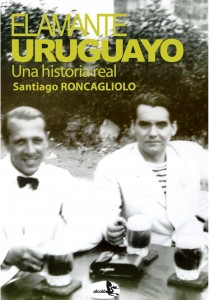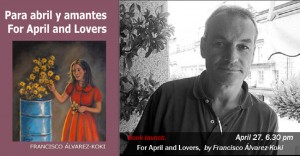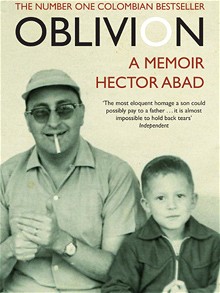‘El amante uruguayo’ / ‘The Lover from Uruguay’ by Santiago Roncagliolo
Presentación de libro / Book launch
Instituto Cervantes – Auditorio13 de junio. 7:00 pm
 ¿Robó el cadáver de García Lorca el escritor uruguayo Enrique Amorim? ¿Fue el culpable de su asesinato? ¿Fue su amante en Argentina? ¿O lo inventó todo, tratando de pasar a la historia junto a uno de los mejores poetas del siglo XX?
¿Robó el cadáver de García Lorca el escritor uruguayo Enrique Amorim? ¿Fue el culpable de su asesinato? ¿Fue su amante en Argentina? ¿O lo inventó todo, tratando de pasar a la historia junto a uno de los mejores poetas del siglo XX?
Santiago Roncagliolo nos presenta a uno de los personajes más enigmáticos del mundo hispano, un camaleón que se hacía pasar por Jean Paul Sartre y saboteaba a Pablo Neruda; y cuya fascinación por García Lorca lo llevó a plantear grandes misterios. Con fotografías tomadas por el propio Amorim, Roncagliolo nos cuenta su historia, que es también la historia del arte y la literatura del siglo XX.
Dentro de Geografía postal. Las postales de las familias García Lorca y De los Ríos. Exposición
Did the Uruguayan Enrique Amorim steal the corpse of García Lorca? Was he guilty of his murder? Was he his lover in Argentina? Or did he make up everything, trying to go down in history with one of the greatest poets of the 20th century?
Santiago Roncagliolo will introduce one of the most mysterious characters of the Hispanic World, a chameleon that impersonated Jean Paul Sartre and sabotaged Pablo Neruda, and whose fascination for García Lorca gave way to great mysteries. With photographs taken by Amorim himself, Roncagliolo tells us his story, which is also part of the history of 20th century art and literature
SANTIAGO RONCAGLIOLO en la BIBLIOTECA ‘JORGE LUIS BORGES’
OBRAS
- Abril rojo.– [Madrid]: Alfaguara,[2006] Premio Alfaguara de novela 2006- ISBN 84-204-7052-X
- Jet lag.– Madrid: Alfaguara, 2007.- (El Boomeran(g); El blog literario latinoamericano) ISBN 978-84-204-7166-2
- Matías y los imposibles [Recurso electrónico. Audiolibro] /[narrador, Menchu González]. – [Castro Urdiales: Editoral Livervox, 2009] (90 min.) : MP3. Acceso restringido a los usuarios con carné de biblioteca del Instituto Cervantes.ISBN 978-84-92793-17-4
- El príncipe de los caimanes.-Barcelona: Editorial Seix Barral, 2006. ISBN 9788432212291
- Pudor [Recurso electrónico. Audiolibro] /[narrador, Eladio Ramos].- [Castro Urdiales: Editorial Livervox, 2009] (226 min.) : MP3. Acceso restringido a los usuarios con carné de biblioteca Instituto Cervantes. ISBN 978-84-92793-19-8
- Tan cerca de la vida.– Madrid: Alfaguara, [2010] –ISBN 978-84-204-0633-6
PRÓLOGOS
- QUIROGA, Horacio: Cuentos de la selva / prólogo de Santiago Roncagliolo; ilustrado por Miguel Carini.- Jaén: Alcalá editores, 2009. (Libros de autor ilustrados) ISBN 978-84-96806-66-5
‘El olvido que seremos’ / ‘Oblivion A memoir’ Héctor Abad
Mesa redonda y discusión / Round table discussion
Instituto Cervantes – Auditorio 17 de mayo 7:00 pm
Héctor Abad Faciolince en el Cervantes mantendrá una conversación con el escritor Álvaro Enrigue, literatura, memoria, olvido y vidas contadas. Un encuentro para conocer mejor al autor de «El olvido que seremos». Presentará su traducción al inglés «Oblivion A memoir.»
Traducción simultánea /Simultaneous interpretation
El autor firmará su libro en inglés /The author will sign a copy of his book in English for you
Dentro de Encuentro con la narrativa Ciclo de conferencias
Oblivion is a heartbreaking, exquisitely written memorial to the author’s father, Héctor Abad Gómez, whose criticism of the Colombian regime led to his murder by paramilitaries in 1987. Twenty years in the writing, it paints an unforgettable picture of a man who followed his conscience and paid for it with his life during one of the darkest periods in Latin America’s recent history
Héctor ABAD FACOLINCE y Álvaro ENRIGUE en la BIBLIOTECA ‘Jorge Luis Borges’
- Angosta / Héctor Abad Facolince.- 1ª ed.- Barcelona: Seix Barral, 2004. (Biblioteca breve) ISBN 84-322-1185-0
- Asuntos de un hidalgo disoluto / Héctor Abad Facolince .- 1ª ed., 1ª reimp.- Bogotá: Tercer Mundo, 1994. (Colección Prisma) ISBN 958-601-495-9
- El olvido que seremos / Héctor Abad Facolince .- 1ª ed., 6ª reimp.- Barcelona: Seix Barral, 2009 (Biblioteca breve) ISBN 978-84-322-1242-0
- Tratado de culinaria para mujeres tristes / Héctor Abad Facolince.- 2ª ed.- Medellín: Celacanto, 1996
………
- El cementerio de sillas / Álvaro Enrigue.- [Madrid]: Lengua de Trapo, [2002] (Nueva biblioteca; 71) ISBN 84-89618-98-4
- Decencia / Álvaro Enrigue .- 1ª ed.- Barcelona: Anagrama, 2011. (Narrativas hispánicas; 483) ISBN 978-84-339-7223-1
- Hipotermia / Álvaro Enrigue .- Barcelona: Anagrama, 2005
- La muerte de un instalador / Álvaro Enrigue .- México: Random House Mondadori, 2008. ISBN 9789708102445
- Vidas perpendiculares / Álvaro Enrigue.- 1ª ed.- Barcelona: Anagrama, 2008. (Narrativas hispánicas; 436) ISBN 978-84-339-7174-6
The Last Good Land: Spain in American Literature / La tierra prometida: España en la literatura americana
Presentación de libro
Instituto Cervantes – Auditorio, 16 de mayo 7:00 pm
Eugenio Suárez Galbán, hablará sobre su último libro junto a William Scherzer, Barbara Probst Solomon y Antonio Muñoz Molina
Pocos libros han estudiado la presencia e influencia de España en la literatura americana. ‘The Last Good Land’ abarca la mayor parte del siglo XX, incluyendo grupos como La Generación Perdida, escritores afroamericanos y exiliados. La variedad de autores tratados, desde Washington Irving hasta Barbara Probst Solomon, pasando por Ernest Hemingway o Herman Melville, garantiza una visión global y variada de la cultura española.
En español con traducción simultánea / Simultaneous interpretation
Dentro de Encuentro con la narrativa Ciclo de conferencias
Book launch
Eugenio Suárez Galbán, will talk about his latest work with William Scherzer, Barbara Probst Solomon and Antonio Muñoz Molina
Books studying the presence of Spain in American literature, and the possible influence of Spain and its literature on American authors, are still rare.’ The Last Good Land‘ covers most of the twentieth century, including such groups as the Lost Generation and African American writers and exiles. The variety of authors treated, both in respect to ethnicity and gender, guarantees a varied and global view of Spanish culture by American writers
EUGENIO SUÁREZ GALBÁN en la BIBLIOTECA ‘JORGE LUIS BORGES’
- DOUGHERTY, Dru: Un Valle-Inclán olvidado: entrevistas y conferencias / ed. de Eugenio Suárez Galbán.- Madrid: Fundamentos, 1983. ISBN 8424503562
- Balada de la guerra hermosa / Eugenio Suárez-Galbán.- Madrid: Fundamentos, 1983
- Como una brisa triste / Eugenio Suárez-Galbán.- Madrid: Fundamentos, 1986
- Lezama Lima / ed. Eugenio Suárez-Galbán.- Madrid: Taurus, 1987. (Persiles; 182. Serie El Escritor y la crítica)
- The last good land : Spain in American literature / Eugenio Suárez-Galbán.- Leiden: Universiteit Leiden, 2005
Rafael Rojas. ‘La máquina del olvido: Mito, historia y poder en Cuba’ / ‘The Oblivion Machine. Myth, History and Power in Cuba’
Presentación de libro / Book launch
Instituto Cervantes NY- Auditorio
08 de mayo. 07:00 pm
 El escritor Rafael Rojas presentara un conjunto de ensayos sobre la historia de las ideas en Cuba que analiza el nacimiento de su historiografía, la cultura política en la isla anterior a la Revolución, la constitución y su poca influencia en países que quisieron seguir el modelo Fidelista, la construcción de un discurso castrista único y la forma en que éste se empeña en sobrevivir.
El escritor Rafael Rojas presentara un conjunto de ensayos sobre la historia de las ideas en Cuba que analiza el nacimiento de su historiografía, la cultura política en la isla anterior a la Revolución, la constitución y su poca influencia en países que quisieron seguir el modelo Fidelista, la construcción de un discurso castrista único y la forma en que éste se empeña en sobrevivir.
Rafael Rojas es uno de los críticos culturales e historiadores del Caribe más distinguidos, así como un reconocido escritor de la historia de Latinoamerica. Autor de numerosos libros como ‘El estante vacío: literatura y política en Cuba’. Anagrama, 2009 o »Tumbas sin sosiego: revolución, disidencia y exilio del intelectual cubano’.- Anagrama, 2006 y unos cien ensayos, ha obtenido numerosos reconocimientos, incluido el ‘Premio Matías Romero’ (2001) y el ‘Premio Ensayo de Anagrama’ (2006). Asimismo, se ha convertido en uno de los intelectuales públicos más destacados
Traducción simultánea /Simultaneous interpretation
Dentro de Encuentro con la narrativa / Encounter with the Narrative Ciclo de conferencias
‘The Oblivion Machine. Myth, History and Power in Cuba’
Writer Rafael Rojas will introduce a collection of essays about the history of ideas in Cuba, which analyses the beginning of its historiography, the political culture of the island prior to the Revolution and its constitution. Rojas will examine the little influence Cuba has had in countries that tried to follow Fidel’s model, the construction of one sole Castro discourse and the way its followers are determined that it survive.
Rafael Rojas is one of Cuba’s most distinguished Caribbean historians and cultural critics, and a renowned writer of Latin America history. Rojas is the author of many books ‘El estante vacío: literatura y política en Cuba’. Anagrama, 2009 ; »Tumbas sin sosiego: revolución, disidencia y exilio del intelectual cubano’.- Anagrama, [2006] and a hundred scholarly essays and he has won numerous international awards, including the ‘Premio Matías Romero’ (2001) and the ‘Anagrama Essay Award’ (2006). He has also become one of Cuba´s most prominent public intellectuals
Francisco Álvarez-Koki: ‘Para abril y amantes’ / ‘For April and Lovers’
Presentación de libro / Book launch
27 de abril 6:30 pm
Instituto Cervantes de Nueva York – Auditorio
 Francisco Álvarez-Koki (A Guarda, Galicia. 1957) nos presentará su último trabajo ‘Para abril y amantes’, donde navega entre la poesía social y amorosa.
Francisco Álvarez-Koki (A Guarda, Galicia. 1957) nos presentará su último trabajo ‘Para abril y amantes’, donde navega entre la poesía social y amorosa.
Antonio Muñoz Molina que presentará al autor, ha dicho del poeta gallego: “Como un músico que tocara con soltura varios instrumentos, Francisco Álvarez Koki se mueve igual de ágilmente por los más variados tonos de la expresión poética, que son todos, al fin y al cabo, partes de un mismo arrebato. Leer los poemas en el orden en que se publican es como seguir el trazo sostenido y cambiante de los estados de una pasión, en la que nada está seguro, en la que no hay más certeza que la propia entrega”
En español con traducción simultánea / Simultaneous interpretation
Dentro de Encuentro con la narrativa Ciclo de conferencias
Francisco Álvarez-Koki (A Guarda, Galicia. 1957) will discuss his most recent collection of poems ‘For April and Lovers’ in which he navigates through love and social issues. Writer Antonio Muñoz Molina has said the following about the author: “Just like a musician who plays multiple instruments fluently, Francisco Álvarez-Koki moves with the same agility through the different shades of poetic expression, which are after all, part of the same fit. To read the poems in the order in which they were published is like following the continuous yet changing strokes of the different states of a passion, in which nothing is certain, in which there is no greater certainty than devotion itself”
FRANCISCO ÁLVAREZ-KOKI en la BIBLIOTECA ‘JORGE LUIS BORGES’
OBRAS
- Alén da fronteira.- Pontevedra: Egasur, 1999. ISBN 8493073946
- Con Eliseo Alonso.- Pontevedra: Diputación Provincial, Servicio de Publicaciones,2004. ISBN 8484572064
- Desde la otra orilla.- España: Concello de Tomillo, [s.a.]
- Entre dos aguas.- Estados Unidos: The Latino Press, 1995. ISBN 1-884912-03-6
- Entre tu cuerpo y mi cuerpo: Antología de Amor (1980-1996).- A Guarda: Concello de A Guarda, 1996. 1 mención honorífica Círculo de escritores iberoamericanos 1996, Nueva York. [Firmado por el autor]
- Lexanías.- Pontevedra: Imprenta Guardesa, 1980
- Máis aló de Fisterre.- Pontevedra, España: Diputación Provincial de Pontevedra,1991. ISBN 84-86845-67-X
- Maruxía.- [s.l.] : Ayuntamiento de Tomino, 1989. ISBN 84-404-5290-X
- Para el amor pido la palabra.- 2ª ed.- Buenos Aires: Lumen, 1987 ISBN 84-86662-00-1
- Poemas del verbo amar.- Pontevedra: Imprenta Guardesa, 1981
- Sombra de luna.- Nueva York: Ediciones Moria, 1990
ANTOLOGÍAS
- AL fin del siglo: 20 poetas / Francisco Alvarez-Koki y Pedro R. Monge Rafuls (editores).- Jackson Hts., NY : Ollantay Press, 1999. ISBN 0962512796
- CIRCUNFERENCIA de la palabra / Palma, Janis; Alvarez-Koki, Francisco; Morales Caballero, Linda; Montesinos, Jaime; Caparrós, Rosa.- Nueva York: Ediciones Moria, 1989
- PIEL PALABRA : Muestra de la poesía española en Nueva York .- Nueva York: Consulado General de España en Nueva York, 2003. ISBN 8468831476

